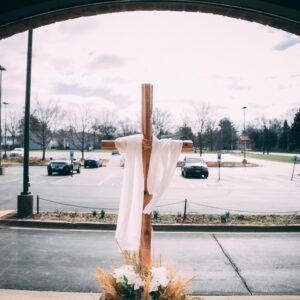What does the word religious mean to you? The meaning has changed over the years for me. Growing up, I thought of it as a simple, but good, word describing someone who loved God and went to church. Then sometime around my late high school or early college years, I developed negative feelings toward it.

“You’re religious, aren’t you?” Whenever someone asked me that, I took it as just an observation that I attended church and talked about God. Perhaps it bothered me because my relationship with Jesus had expanded beyond that narrow idea. Or maybe, since there are so many religions in the world, I considered “religious” too general to accurately describe me.

For a while I responded by saying that I wasn’t religious, I was spiritual. It sounded more…well…spiritual to me. But it was the ’60s and ’70s when the counterculture was finding spiritual expression outside the Judea-Christian religion of their parents and I didn’t want people to be confused about which spirit I followed, so I stopped saying that. The best response I came up with was an effort to convey that my “religious” life went deeper than the outward things I did, that it was an actual relationship with Jesus.
But it’s always best to seek out what God has to say, and James tells us a lot about religion in just two verses of scripture:
“26If anyone considers himself religious and yet does not keep a tight rein on his tongue, he deceives himself and his religion is worthless. 27Religion that God our Father accepts as pure and faultless is this: to look after orphans and widows in their distress and to keep oneself from being polluted by the world.” (James 1:26-27)
Religious is translated from the Greek word thréskos and refers to “a careful observance of religious restrictions” (Strong’s Concordance). Similarly, religion, from the Greek word thréskeia, means “religious worship, especially external, that which consists in ceremonies” (Thayer’s Greek Lexicon).

James was speaking of the Christian religion, and he was writing to believers in Christ. Yet, he recognized that among them were those who were not devoted to Jesus even though they appeared to be by their careful observance of rituals and ceremonies. They weren’t being hypocritical; they truly thought they were being good Christians. But James tells us they were deceiving themselves.

James said their devotion could be determined with the loose-tongue test (v.26). (He has more to say about the tongue in Chapter 3.) All our religious observances mean nothing to God if we use our mouth to spread untruths, put people down, speak negatively, spew anger, damage reputations. Such talk certainly wouldn’t make it appealing to follow Christ. James went so far as to say that if we don’t control our tongue, our “religion is worthless.”

I could get the idea that God shares my negative thoughts toward religion. However, I don’t believe he does. One reason is because he calls us to keep some of those outward observances. We are to meet regularly with other believers (Hebrews 10:25). We are to observe communion in remembrance of him (1 Corinthians 11:23-26). Jesus tells us that his disciples are to be baptized (Matthew 28:19).
Another reason I don’t see Jesus as anti-religion is that James tells us there is a religion God accepts. It is “pure and faultless.” We just need to see it as God does. James gives us three specific qualities of a pure religion that pleases God.
One quality we’ve already looked at: we “keep a tight rein on [our] tongue” (v.26). Since our unbridled tongue causes our religion to be worthless, it is logical that setting “a guard over my mouth” (Psalm 141:3), having our “conversation be always full of grace” (Colossians 4:6), and “speak[ing] the truth to each other” (Zechariah 8:16) contribute to God’s pure religion. Jesus is “full of grace and truth” (John 1:14), and so must we be to represent him to the world. Our tongue reveals how we are doing.
Another quality of pure religion is that we “look after orphans and widows in their distress” (v.27). These were the two most helpless and vulnerable groups of people in the first century. If no family member would care for them, they would have to beg, become slaves, or starve. They represent those in our world who need our help: an abused child, an unemployed father, a homeless family. “The Lord is good to all; he has compassion on all he has made” (Psalm 145:9). If we follow God, we will share his compassion.
The last quality James writes of is that we “keep oneself from being polluted by the world” (v.27). If we have become a believer in Jesus, we still live in the world but we are no longer a part of it. “Our citizenship is in heaven” (Philippians 3:20). However, God has work for us to do here, and we will be ineffective if we are stained by the sin of the world. Jesus was “without blemish or defect” (1 Peter 1:19). “There is no one holy like the Lord” (1 Samuel 2:2). Peter admonishes us, “Just as he who called you is holy, so be holy in all you do” (1 Peter 1:16).

Curtis Vaughan says in James: Bible Study Commentary that James’ intention was not to say this is an all-inclusive definition of the religion God accepts. “He is simply emphasizing that the externals of religious worship are unacceptable to God unless accompanied by loving service and a holy life” (p.42).
Pure religion that God accepts isn’t being faithful to observances, but to God himself. It’s living for Jesus every day. It’s living like Jesus every day.
So am I religious? Hopefully not in the self-deceptive way. I’m moving toward more fully reflecting the life of Jesus every day by living a compassionate and holy life. I’m still not crazy about the word religion, but my aversion to it has lessened. After all, according to God, pure religion and Jesus look exactly alike.
Scripture quotations are from NIV.
Feature photo by Brandon Morgan on Unsplash





marilyn hempfling
July 15, 2023Thanks for such clarity. I had gotten to the point that if someone said I was religious, it was almost an insult. But I eventually realized that people who are unbelievers have no concept of a relationship with Jesus. They only look at the outward things we say or do, so the caution to guard our tongues and care for others was a good reminder that the world is watching my “religion”. Thanks again.
Marilyn
bspencer
July 15, 2023I know what you mean about feeling insulted. Sometimes I felt like that, too. Like when it came from someone who doesn’t like God. But then others may offer it as a compliment because they think what they see is admirable, even though it may not be at all. I guess I just need to make sure that what people see in my life is the real thing.
Thanks, Marilyn
Brenda+Murphy
July 15, 2023Oh that’s interesting. Today “religious” simply refers to any religon and is a turn-off, as you’ve said, but it’s interesting to understand the true concept of it. Thanks. 🙂
bspencer
July 15, 2023You are welcome, Brenda. Thanks for reading and sharing your thoughts.